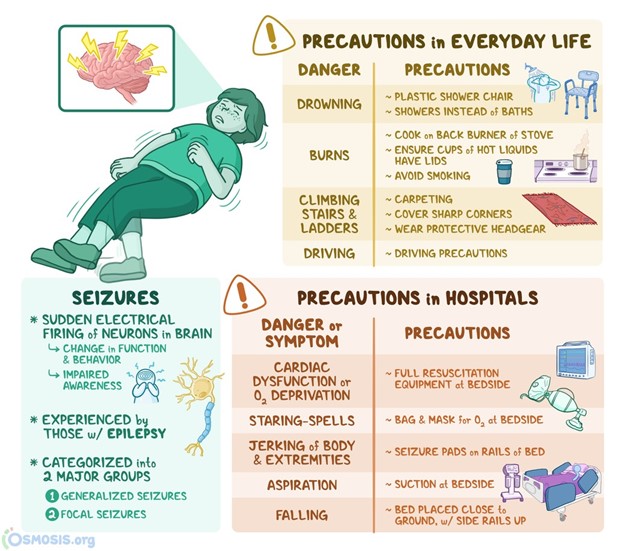A nurse is caring for an adolescent who has hyperthermia.
Which of the following actions should the nurse take?
Cover the adolescent with a thermal blanket
Submerge the adolescent’s feet in ice water
Initiate seizure precautions
Administer oral acetaminophen
The Correct Answer is C

Hyperthermia is a condition in which the body temperature is abnormally high, usually due to exposure to heat, infection, or certain medications.
Hyperthermia can cause neurological complications, such as seizures, confusion, or coma. Therefore, the nurse should initiate seizure precautions for an adolescent who has hyperthermia to prevent injury and protect the airway.
Choice A is wrong because covering the adolescent with a thermal blanket would increase the body temperature and worsen hyperthermia. The nurse should remove excess clothing and use cooling measures, such as fans, ice packs, or cool fluids.
Choice B is wrong because submerging the adolescent’s feet in ice water would cause vasoconstriction and shivering, which would reduce heat loss and increase heat production. The nurse should avoid using extreme cold or ice water to cool the body.
Choice D is wrong because administering oral acetaminophen would not be effective for hyperthermia caused by non-infectious factors, such as heat exposure or medications.
Acetaminophen lowers the body temperature by reducing the hypothalamic set point, which is not altered in hyperthermia. Additionally, oral medications may be difficult to swallow or absorb in a hyperthermic patient.
Normal body temperature ranges from 36.5°C to 37.5°C (97.7°F to 99.5°F). Hyperthermia is defined as a body temperature above 38.5°C (101.3°F).
Nursing Test Bank
Naxlex Comprehensive Predictor Exams
Related Questions
Correct Answer is A
Explanation
Explanation:
"I will use a cool-mist vaporizer in my baby's room." This statement demonstrates an understanding of the teaching. Using a cool-mist vaporizer can help maintain moisture in the air and alleviate nasal congestion in infants.
Incorrect:
B- "I will leave my baby's bib on while he is sleeping." This statement indicates a lack of understanding. It is not safe to leave a bib on an infant while they are sleeping as it can pose a suffocation risk.
C- "I will leave the plastic covering on the crib mattress." This statement indicates a lack of understanding. The plastic covering on the crib mattress should be removed as it can pose a suffocation hazard.
D- "I will lay my baby's head on a pillow while he is in the crib." This statement indicates a lack of understanding. Pillows should not be used in the crib for infants as they can increase the risk of suffocation and SIDS (Sudden Infant Death Syndrome).
Correct Answer is B
Explanation
B) I can visit my nephew who has chickenpox 5 days after the sores have crusted.
This statement indicates an understanding of infection prevention because it demonstrates knowledge about the contagious period of chickenpox. Visiting someone with chickenpox after the sores have crusted is a safe practice, as the person is no longer contagious.
The other options represent misconceptions about infection prevention:
A) Taking antibiotics for a viral infection is not effective, as antibiotics are used to treat bacterial infections, not viruses.
C) This statement is identical to option B and is incorrect.
D) Cleaning a cat's litter box during pregnancy is generally not recommended due to the risk of toxoplasmosis, a parasitic infection that can be transmitted through cat feces. Pregnant individuals are advised to have someone else handle cat litter or to use gloves and wash their hands thoroughly if they must do it themselves.
Whether you are a student looking to ace your exams or a practicing nurse seeking to enhance your expertise , our nursing education contents will empower you with the confidence and competence to make a difference in the lives of patients and become a respected leader in the healthcare field.
Visit Naxlex, invest in your future and unlock endless possibilities with our unparalleled nursing education contents today
Report Wrong Answer on the Current Question
Do you disagree with the answer? If yes, what is your expected answer? Explain.
Kindly be descriptive with the issue you are facing.
